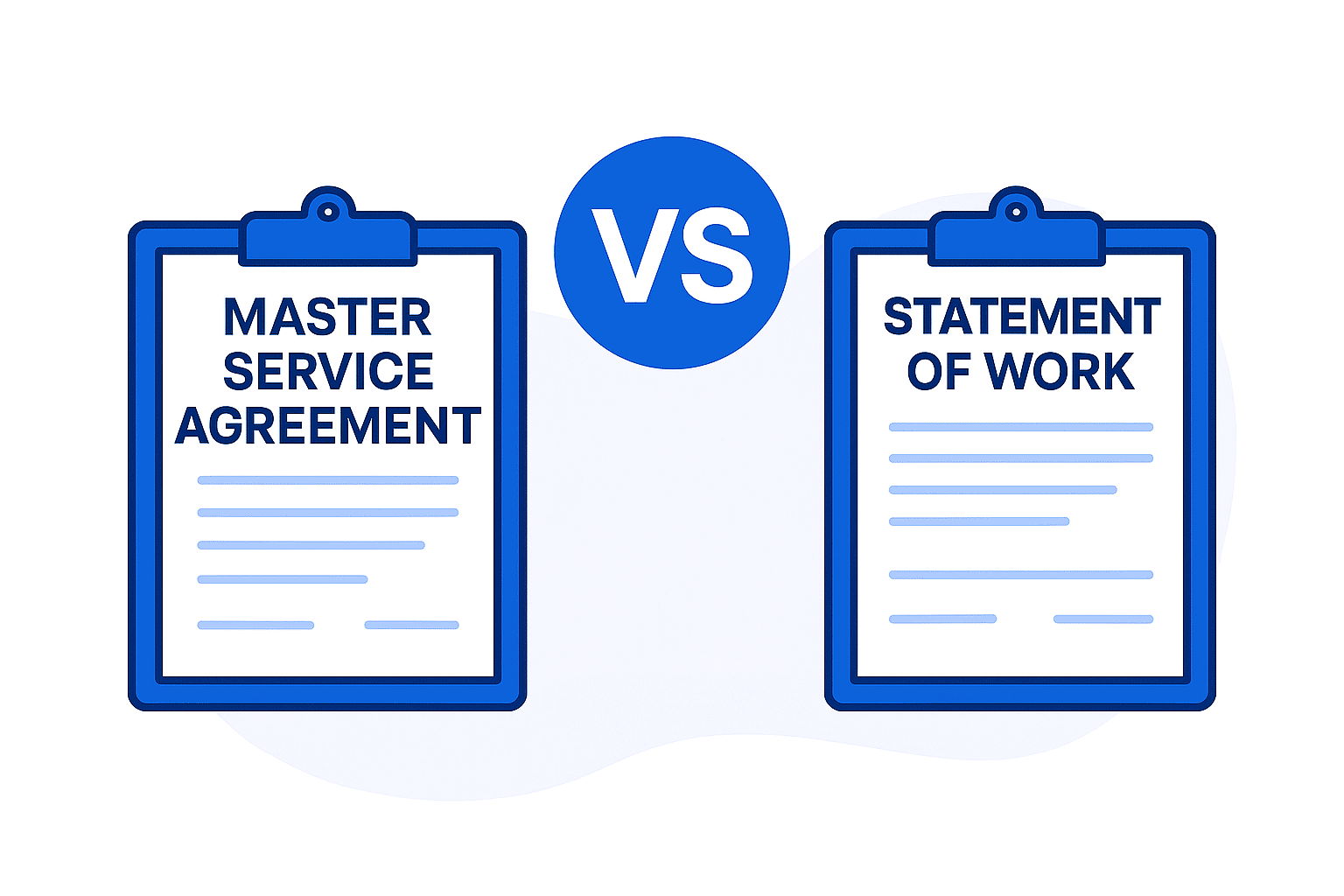release:
update:
Master service agreement vs statement of work: Are they the same?

Master service agreement vs statement of work are two essential documents in contract management. Understanding the difference between them helps businesses build clear and effective partnerships.
A master service agreement (MSA) sets the overall rules and terms for a long-term relationship. In contrast, a statement of work (SOW) focuses on the details of a specific project or task. Knowing how these documents work together can improve communication, reduce risks, and ensure smoother project delivery.
This article explains what MSAs and SOWs are, how they differ, and why clear contracts matter for business success.
See why businesses are rushing to SignTime’s feature-packed contract repository system.
What is a master service agreement (MSA)?
A master service agreement (MSA) is a contract that establishes the general terms and conditions between two parties. It sets the foundation for a long-term business relationship by defining roles, responsibilities, payment terms, confidentiality, and legal obligations.
MSAs are designed to simplify future contracts by avoiding the need to renegotiate these common terms each time a new project begins. They typically cover ongoing services and remain in effect for months or years, providing a stable framework for collaboration.
What is a statement of work (SOW)?
A statement of work (SOW) is a detailed document that describes the specific tasks, deliverables, timelines, and costs for a particular project or engagement. Unlike the broad terms in an MSA, the SOW focuses on the practical aspects of what needs to be done. It outlines project goals, scope, deadlines, and payment schedules.
The SOW is usually created for each individual project and references the overarching MSA to ensure consistency with the general terms already agreed upon.
Key differences between MSAs and SOWs
Master service agreements and statements of work serve different but complementary purposes. An MSA covers the broad terms of a long-term relationship between parties. It addresses legal obligations, payment terms, and confidentiality.
On the other hand, an SOW is project-specific. It details the scope, deliverables, deadlines, and pricing for individual engagements. MSAs tend to be more flexible and long-lasting, while SOWs are focused and limited to the duration of a single project. Understanding these differences helps businesses manage contracts more effectively and avoid confusion.
How MSAs and SOWs work together
MSAs and SOWs function as parts of a complete contract management system. The MSA provides the legal foundation and general terms that govern the overall relationship. Each SOW then specifies the details for individual projects within that framework. This setup allows businesses to quickly start new projects without renegotiating core terms.
When conflicts arise, the MSA usually takes precedence, but clear drafting of both documents helps prevent misunderstandings. Together, they create a balance of flexibility and control for ongoing business collaborations.
MSA vs SOW
This section compares master service agreements and statements of work side by side. The table below highlights key differences and similarities across important aspects of each document.
| Aspect | Master Service Agreement (MSA) | Statement of Work (SOW) |
| Purpose | Sets overall terms for ongoing relationship | Details specific project scope and deliverables |
| Scope | Broad and general | Narrow and project-specific |
| Duration | Long-term, often months or years | Limited to the duration of one project |
| Legal terms | Covers confidentiality, liability, payment | References MSA terms, focuses on project details |
| Deliverables | Not specified | Clearly defined |
| Pricing | General payment terms | Specific pricing for the project |
| Flexibility | Flexible for future projects | Fixed for a single project |
| Signing process | Signed once, serves as a master contract | Signed for each new project |
| Relationship type | Governs entire business partnership | Governs individual project or task |
| Change management | Addresses how changes are handled broadly | Specifies project change procedures |
| Risk management | Allocates overall risks between parties | Addresses risks specific to the project |
| Approval process | May include approval systems | Often requires detailed approval per project |
Why clear contracts matter for business success
Clear contracts are essential to avoid misunderstandings and disputes. They set expectations for both parties, defining what is expected and what will be delivered. Well-drafted contracts reduce risks by specifying responsibilities, timelines, and payment terms.
This clarity helps maintain strong business relationships and supports successful project completion. Without clear contracts, projects can face delays, cost overruns, or legal challenges. Businesses that prioritize clear agreements improve communication and build trust with partners.
SignTime supports MSA and SOW contract management
SignTime offers a powerful platform to manage both master service agreements and statements of work with ease. Its contract repository keeps all documents organized and accessible.
SignTime’s integration with Salesforce streamlines workflows, helping teams track contracts alongside sales activities. SignTime provides multiple ways to generate e-signatures, from uploading a signature to using a patented drawing tool or automatic signature generation. Specialized features like long-term e-signatures and approval systems make handling complex contracts simple.
With SignTime, businesses can improve contract clarity, speed up approvals, and strengthen partnerships.
Download our brochure to see whether SignTime might be a fit for your organization.
